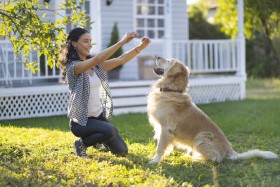How to Train a Deaf Dog Not to Bite

There are a lot of myths and misconceptions about dogs out there, particularly when it comes to deaf dogs. Some people think deaf dogs are more aggressive because they’re more anxious and easier to startle and that they’re harder to train. But none of this is necessarily true. The simple fact of the matter is that all dogs have the potential to bite, regardless of size, breed, or ability to hear. It is absolutely possible to train a deaf dog so that they learn not to bite people, but training them requires a different approach than would be needed for a dog that can hear.
When puppies interact with their mother and other dogs in their litter, they generally learn bite inhibition by hearing yelps if they get carried away and bite too hard while playing. Those sharp, quick yelps send a very strong message. A similar message can also be sent when playing with humans. Young puppies commonly use their mouths while trying to play, and while a human might not necessarily yelp if the dog gets carried away, scolding or yelling “ouch” can get the message across. But since deaf dogs aren’t able to get these kinds of audio cues, they need extra help to learn this valuable lesson.
One time a deaf dog might bite is if they are startled. Dogs that can hear are more likely to be a loud, sudden noise, but deaf dogs can be startled by an unexpected touch. To train a dog to not be startled by being touched, one thing you can do is gently touch the dog while it’s sleeping and give it a treat when it turns to look in your direction. That way, the dog learns to not be afraid of being touched unexpectedly. The Deaf Dog Education Fund recommends touching the dog gently in the same place each time you do this, such as on the shoulder, so that they’re more likely to understand when a touch is friendly.
Another option is to give a dog a bit of a time out if they nip a little too hard. Normally, if a puppy bites one of its littermates too hard, the other dog will yelp and back away, making it clear that this kind of behavior is socially unacceptable. But if this happens with a deaf dog, they might not understand why they are being left alone since they don’t hear the yelp. When training a deaf dog, it’s important to make sure they see you using clearly negative body language as you scold them before leaving them alone for a while so that they learn biting is a form of negative behavior.
Many owners of deaf dogs use hand signals to communicate signals to their pet, just like how sign language is used to communicate with deaf people. Hand signs can be used to teach your dog basic commands like “sit,” “stay,” “leave it,” and “come.” Make sure each hand sign is distinct so that the dog won’t confuse one signal for another. When training a dog, it’s important to use positive reinforcement to encourage good behavior. In the case of deaf dogs, clapping can still be used as positive reinforcement, but it’s important to make sure the dog can see you when you while you clap and smile while you do so. If you need more help working with your dog, try to find a trainer in the area who has experience working with deaf dogs.
As is the case for dogs that can hear, socialization plays a big part in helping deaf dogs become more comfortable in different situations so that they’re less likely to bite. For a deaf dog, it’s best to make sure the dog is on a leash at all times when they’re in an un-enclosed area, such in a yard that’s not fenced in, while going for a walk, or visiting a dog park. This is recommended by the Deaf Dog Education Fund and many dog safety experts. Since deaf dogs aren’t able to hear commands from their owner, they won’t be able to come when called and might be too far away to see hand signals.
All dog owners have a responsibility to take steps to make sure their pets are kept under control so that they don’t hurt anyone. This is true whether a dog can hear or not. Michigan has strict liability dog bite laws which mean owners can be liable for a dog bite injury even if the dog has never shown a history of aggressive behavior. If you’ve been injured by a dog bite, don’t hesitate to contact a dog bite lawyer. At Goodwin & Scieszka, we have years of experience working with Michigan dog bite victims and helping them get all the compensation they need. Contact us today for help with your claim.
Credit: iStock / Vladimir Vladimirov






